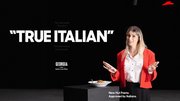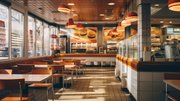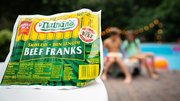News
Sleeker Carl's Jr. beefing up Arizona presence
Weak burger sales nationally and an abundance of competition haven't scared away the grandchildren of the Carl's Jr. chain's founder from plans to invest millions of dollars opening 80 more Valley stores.
April 14, 2003
Apr. 15, 2003 12:00 AMWeak burger sales nationally and an abundance of competition haven't scared away the grandchildren of the Carl's Jr. chain's founder from plans to invest millions of dollars opening 80 more Valley stores. The first of the new restaurants opened this month in Mesa. Another is under construction at Chandler Boulevard and 48th Street. In all, 20 are planned through 2004, which will double the chain's Valley presence.The remaining 60 are planned through 2007. "That's really just growing with the market. That's not unreasonable" growth, said Jason LeVecke, grandson of Carl Karcher and director of administration for the Arizona franchisee, MJKL Enterprises. MJKL, which is managed by five of Karcher's grandchildren, sees much potential selling its Western Bacon Burger in Arizona, where overall restaurant sales are predicted to grow 7 percent.That growth, particularly in the East and West valleys, has been attracting restaurants into the state and sparking the expansion of others, said Steve Chucri, president of the Arizona Restaurant Association. Even in the quick-serve category, which isn't expected to grow as quickly, setting up in 80 new locations wouldn't be excessive. "It's probably an aggressive goal, but it is achievable," Chucri said. "They do have a unique style."The additions also will make Carl's Jr. more of a competitor to burger market leader, McDonald's, which has 183 restaurants in Phoenix and northern Arizona. McDonald's declined to comment on the competition or whether it plans to add restaurants in the Valley. Analysts say Carl's Jr. could do well in expanding in Arizona and other areas. And unlike its competitors, it is seeing same store sales nationally grow, albeit marginally. During the first quarter this year, sales were up 0.8 percent nationally. McDonald's showed a 2 percent drop in comparable sales for the first quarter, and Wendy's reported a 3 percent drop in March sales, compared with a 6.1 percent gain in March 2002.Carl's has broken away from the traditional fast-food classification, analysts said.The chain's slogan is "restaurant-style food at a fast-food place," and its redesign is aimed at giving the restaurant a much more casual dining feel. Plans here include a more contemporary design with concrete painted floors and exposed ductwork in the ceiling. The décor will have an industrial feel, with steel-colored padded chairs and booths and televisions hanging from the ceilings. Walls will feature bright colors.And the outside won't look boxy, as newer stores will have sharper angles and lots more glass. This morphing of fast food and casual dining, known as fast casual, is a fast-growing part of the industry. Technomic Inc., a Chicago-based food service consulting and research firm, estimates that growth of these fast casual restaurants at 8 to 9 percent this year, compared with 2 to 3.4 percent in fast food. It defines quick casual as having a $6-$9 meal prices.Carl's, generally categorized as fast food, falls into a $5-$6 average ticket, analysts said.Arizona Restaurant Association's Chucri said the move by Carl's Jr. to add service could change the way other fast-food restaurants operate, much like when casual dining introduced take-out service. to their restaurants. "I don't know how prevalent this is going to become in the quick-serve industry, but it could catch on," he said. LeVecke said the change has been part of a plan to help it stand out. "We're not in the 99-cent wars," he said. McDonald and other industry player have been locked in low price war that has stifled earnings. Carl's Jr. has stayed out of those wars.To expand in the Valley, MJKL bought out four franchisees and invested $1 million in renovating restaurants. "As a family, we took over two restaurants in the county and quickly realized Carl's Jr. didn't have the image we wanted it to have," he said. Since taking over, MJKL reports a 20 percent jump in same store sales. MJKL joins Del Properties - made up of LeVecke, R. David Evans, Howard Schapira and Parviz Donboli - to develop the restaurants. Each is estimated to cost $1.5 million to $2 million, depending on land costs. To help finance that, the group is looking for help from private investors. Plans are for Del Properties to buy the land and build the restaurant, then either hold on to it or sell it to a private investor, with a 20-year lease to MJKL. "Money isn't the issue," LeVecke said. "It's finding the best site."
 ChatGPT
ChatGPT Grok
Grok Perplexity
Perplexity Claude
Claude








